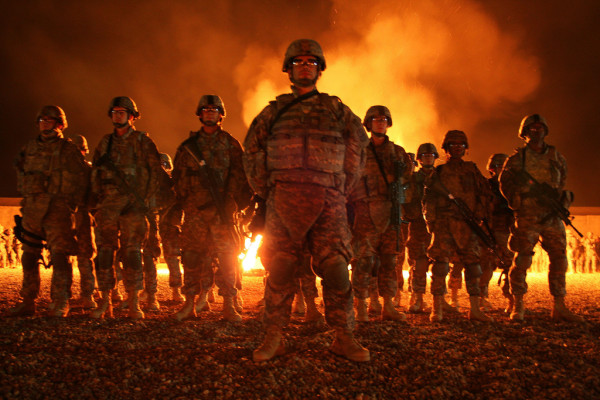

The next time some civilian says the word “followership,” or any strange perversion of verbiage thereof, I am going to see just how much combatives I recall.
“Good leadership comes from good followership” is a phrase I have now heard three times in less than a week, all from people who never served a day, and I don’t buy it for a minute. Yes, knowing how to take instructions helps. You have to know how you are coming across to those you lead, and you need a good understanding of clear messaging.
Followership is “the reciprocal social process of leadership,” according to the 15-year-olds who populate the all-knowing Wiki. That just says a leader has followers. However, followership is the least of my worries when I’m looking for new leaders to help me with my projects, especially with veterans because they should know the basics of true leading.
So, to the guy who just told me he’s putting together a followership class to help build leaders, here is a quick list of qualities for being a good leader:
- Get it done. You are going to get the task accomplished by doing it, not by talking about it. You pull together a group of people and make something happen. Ultimately, the leader is the one who works with the team, helps divide the task, shows it can be done, and takes the ultimate responsibility for the task. But, leave followership out of it, it’s a team. Even when we were little privates, lost and afraid because of all the non-commissioned officers were in a meeting, we teamed up to throw tennis balls at the other platoon after a dynamic conversation of “What should we throw at the other platoon?” I still don’t know where we found tennis balls. The point is, we formed a team and did something, so it was a success in our book. We did the same thing to help teach someone struggling to master a skill, or as we helped another NCO put together a range, or took on reorganizing the MILVAN to get more gear from Baghdad to Mosul. We worked in teams, we worked together, and we weren’t dicks about it (often). We weren’t following, we were working. So…
- Build a team. Build and grow the bond — you don’t need followers, you just need to get it done. A leader who can’t accomplish a task is only leading at wasting my oxygen.
- Be present, even for the awful stuff. I think back on poor leaders and all I can think is “You didn’t leave the wire,” or “Where were you the past five motor pool Mondays?” Ditch out on enough stuff and the natives get restless. We know you have more important things to do, but you don’t have to rub it in our faces. Don’t just hand the intern all the tedious filing. Do some of it, or at least bring him a bandage when he gets a papercut.
- Mean it when you delegate. When you tell someone they are running physical training on Tuesday, they run physical training on Tuesday. You don’t jump in, you don’t micromanage how they get it done, you just give them a task and let them do it. Empowering is critical to everyone’s development. You do have to let them own something to get buy in. So let them.
- Don’t be a dick. Even if you’re about to do your grand, mic-dropping exit, you might still want to take people with you. No one trusted the randomly angry sergeant, he was just randomly angry. People want to know they can trust your opinion. Bring a solution, not an attitude, to the problem and you are officially a leader.
- Make the punishment fit the crime. Once, I was making a soldier push for backtalk. I had him low crawl to the smoking area that time and every time thereafter. After all, if he was going to poison himself he could get a little physical training in to counter it, and maybe think about how he talked to me in the future. My first sergeant walked over and said I couldn’t do that, I had to match the punishment to the offense, and as always, he had a point: You can’t randomly punish those who follow you if you want them to respect you. You can’t tell civilians to low crawl; they probably don’t know how. But you can ensure they are learning from you by designating tasks that teach a lesson and don’t just irritate them. Yes, I low crawled to the smoke pit that first time (I don’t smoke) so this soldier knew my standards. It also got him to police call his route. Bonus!
We spend our first few years in the military almost exclusively following. We follow orders. We march behind someone in formation and on road marches. We move in lines and listen to instructions and learn what to do. And then we lead, while still following those above and in front of us. But we use lessons learned when we were followers to guide others, and the cycle perpetuates itself.
I don’t want a follower, I want a team. I want to share ideas, and I don’t care where they come from. The military makes some of the greatest leaders, so let’s show them what we learned and maybe we can lead the corporate world away from buzzwords like “followership.” Don’t buy into following, buy into teamwork.
Elana Duffy is a 10-year veteran of the U.S. Army and a veteran of the conflicts in Iraq and Afghanistan. She currently lives in New York City.